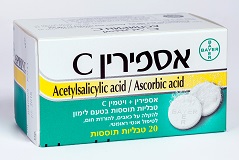Quest for the right Drug

אספירין C ASPIRIN C (ACETYLSALICYLIC ACID, ASCORBIC ACID)
תרופה במרשם
תרופה בסל
נרקוטיקה
ציטוטוקסיקה
צורת מתן:
פומי : PER OS
צורת מינון:
טבליה תוססת : TABLETS EFFERVESCENT
עלון לרופא
מינוניםPosology התוויות
Indications תופעות לוואי
Adverse reactions התוויות נגד
Contraindications אינטראקציות
Interactions מינון יתר
Overdose הריון/הנקה
Pregnancy & Lactation אוכלוסיות מיוחדות
Special populations תכונות פרמקולוגיות
Pharmacological properties מידע רוקחי
Pharmaceutical particulars אזהרת שימוש
Special Warning עלון לרופא
Physicians Leaflet
Special Warning : אזהרת שימוש
4.4 Special warnings and precautions for use Related to Acetylsalicylic acid - Hypersensitivity to other analgesics / anti-inflammatory or antirheumatic drugs or other allergenic substances (see section 4.3). - Existing allergies (e.g. skin reactions, pruritus, urticaria), asthma, hay fever, swelling of the nasal mucous membranes (nasal polyps) or chronic respiratory disease; - Concomitant treatment with anticoagulants (see section 4.5). - History of gastrointestinal ulcers or -bleeding. - Impaired liver function. - Patients with impaired renal function or patients with reduced cardiovascular circulation (e.g. renal vascular disease, congestive heart failure, volume depletion, major surgery, sepsis or major haemorrhagic events), since acetylsalicylic acid may further increase the risk of renal impairment and acute renal failure. - Before surgery (including minor procedures such as dental extractions); bleeding tendency could be increased. - Patients suffering from severe glucose-6-phosphate dehydrogenase (G6PD) deficiency: acetylsalicylic acid may induce haemolysis or haemolytic anaemia. Factors that may increase the risk of haemolysis are e.g. high dosage, fever or acute infections. What other precautions must be taken? One effervescent tablet contains 20.3 mmol (466.4 mg) sodium, which is equivalent to 23% of the maximum daily intake of 2 g of sodium per day recommended by the WHO for adults. Aspirin C is rich in sodium. This must be taken into account by patients on a sodium-controlled (low- sodium/low-salt) diet. Long-term consumption of analgesics can cause headaches resulting in further intake of pain medications that may in turn result in the persistence of headaches. Habitual use of analgesics can lead to permanent kidney damage with the risk of kidney failure (analgesic nephropathy). The risk is particularly high when several different analgesics are taken concomitantly. At low doses acetylsalicylic acid reduces the excretion of uric acid. This may cause a gout attack in patients which already have a tendency to low urine excretion. Children or adolescents Acetylsalicylic acid should not be taken by children or adolescents with feverish illnesses unless they have been instructed to do so by a doctor and other therapeutic measures have failed. Prolonged vomiting in conjunction with such illnesses could be a sign of Reye’s syndrome, a very rare but life-threatening disease which requires immediate medical treatment.
Effects on Driving

שימוש לפי פנקס קופ''ח כללית 1994
לא צוין
תאריך הכללה מקורי בסל
לא צוין
הגבלות
לא צוין
מידע נוסף
עלון מידע לצרכן
29.09.21 - עלון לצרכן אנגלית 25.07.22 - עלון לצרכן אנגלית 12.05.22 - עלון לצרכן עברית 29.09.21 - עלון לצרכן ערבית 25.07.22 - עלון לצרכן ערבית 28.09.24 - עלון לצרכן עברית 29.11.11 - החמרה לעלון 15.05.12 - החמרה לעלון 07.07.20 - החמרה לעלון 13.09.20 - החמרה לעלון 25.06.21 - החמרה לעלון 12.05.22 - החמרה לעלון 25.07.22 - החמרה לעלוןלתרופה במאגר משרד הבריאות
אספירין C